
Post-Op Follow-Up Schedule That Prevents Prosthetic Delays (For Clinicians)
For many clinicians, the surgery is only the first step. What happens after the operation

In a city like Varanasi, where tradition meets resilience, every day is filled with purpose. Whether it’s guiding a boat on the Ganga, weaving Banarasi silk, or simply preparing a meal for family, hands are at the heart of everything. For those who have lost a hand or were born without one, this rhythm of life can be disrupted. Simple tasks become complex. Confidence can take a hit. But that doesn’t mean the story ends there.
At Robobionics, we help people begin again. We don’t just create prosthetic hands—we design bionic hands that restore movement, dignity, and independence. For years, we’ve worked across India to help individuals from all walks of life. Now, more than ever, we’re bringing our mission to Varanasi with full focus. We understand what matters to people here. Reliability. Affordability. And a solution that actually fits their daily life.
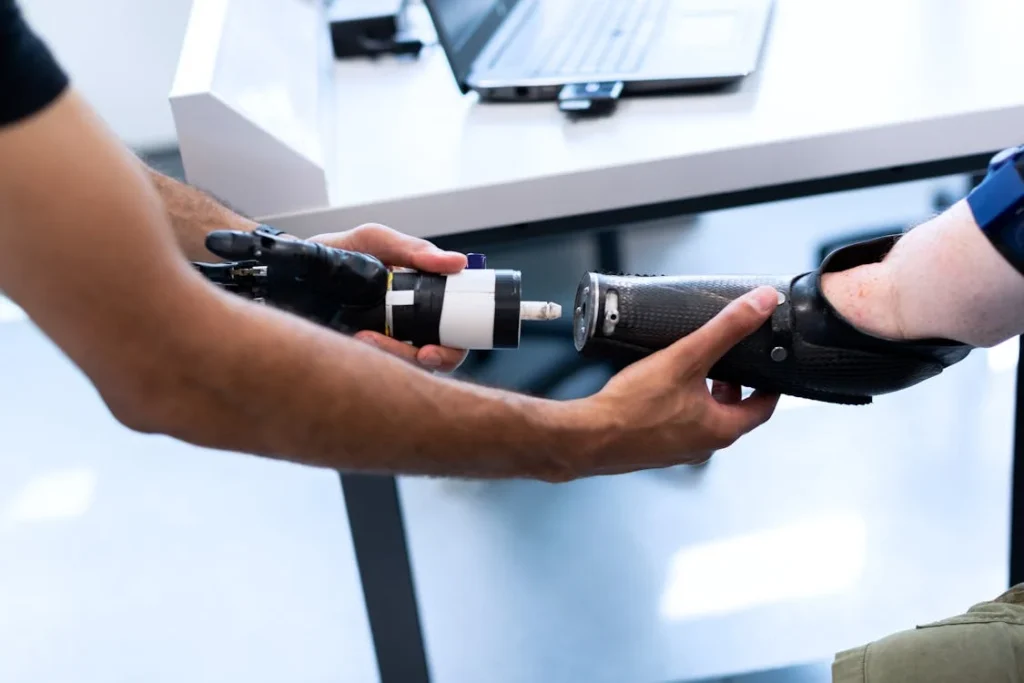
Varanasi is a city like no other. It carries centuries of culture and spirituality, but it also keeps moving forward with the energy of modern life. The people here are known for their strength and determination.
From priests performing morning rituals on the ghats to artisans working tirelessly in workshops, every hand in this city contributes to something meaningful.
That’s why the loss of a hand is more than a physical challenge—it changes how a person lives, works, and sees themselves.
At Robobionics, we’ve seen firsthand how people in Varanasi value practical, reliable solutions. The demands here are unique. There are long hours of physical work, exposure to the sun and dust, and a deep connection to cultural customs that often involve hand use.
This means a prosthetic hand has to do more than just look good. It must feel natural, perform well, and keep up with everyday life. We’ve tailored our bionic hands to do exactly that, by understanding not just how they’re used, but why they’re needed.
For decades, people in India have relied on basic prosthetic options—rubber hands that don’t move, metal hooks that offer limited grip, and bulky devices that are uncomfortable to wear.
While these may have been the only options before, they often end up unused. Why? Because they don’t really help people live better. They sit in drawers or closets because they’re painful, embarrassing, or too difficult to operate.
Many people in Varanasi have tried these traditional devices and felt disappointed. Some even gave up hope of finding a better option.
That’s where Robobionics comes in. We saw the gap between what people were being given and what they actually needed. So, we decided to change the story.
Our bionic hands are designed for real tasks. They open and close smoothly, grip objects gently but firmly, and respond to your thoughts through muscle signals.
They’re smart but simple. Advanced but easy to use. We don’t believe people should settle for outdated technology when something far better is now within reach.
Imagine reaching out and picking up a cup of tea without struggling. Imagine writing your name, combing your hair, or turning a doorknob.
A bionic hand doesn’t just help you do these things—it gives you the ability to do them with confidence. It works by detecting signals from your muscles. When you think about moving your hand, the bionic hand responds.
This connection between thought and movement is what sets bionic hands apart from traditional options. The fingers move individually. The grip strength adjusts depending on what you’re holding. It’s not a fixed clamp—it’s a dynamic, intelligent system designed to act like a real hand.
At Robobionics, we’ve taken this a step further. We’ve built hands that can function in the heat and dust of cities like Varanasi. They don’t overheat or get stuck easily.
They’re strong enough to handle daily chores but sensitive enough to hold delicate objects. We’ve even made sure that the hand feels lightweight, so wearing it doesn’t become a burden.
This technology, once available only in select countries, is now made right here in India. And we’re proud to bring it to the people of Varanasi who deserve the very best.
One thing we quickly realized while working in India is that prosthetics aren’t just medical devices—they’re personal. They’re worn every day, sometimes in front of large groups of people.
So, appearance and cultural comfort matter just as much as function. We’ve heard from many people in Varanasi who were hesitant to wear a prosthetic because it looked too foreign, bulky, or artificial.
That’s why we’ve created a design that looks natural and blends in. The color, texture, and shape are chosen to help users feel comfortable, not self-conscious.
We’ve also taken care to make sure the hand can support the gestures and movements that are part of religious and social life in Varanasi.
Whether it’s joining hands in prayer, taking prasad, or performing everyday rituals, our bionic hands are made to respect and support the customs that matter most.
This attention to detail might sound small, but it changes how people feel. We’ve seen users smile more, speak more, and walk taller simply because they no longer feel like they’re hiding something. When the hand becomes a source of pride instead of shame, everything changes.
Losing a hand doesn’t just mean losing movement—it affects how a person sees themselves. Many people in Varanasi who come to us talk about losing confidence, feeling like a burden, or fearing that they won’t be accepted socially or professionally.
We understand. It’s a deeply emotional experience, and no one should have to face it alone.
That’s why our team includes not just engineers, but compassionate professionals who guide each person with care. When someone from Varanasi comes to Robobionics, we don’t treat them like a customer—we treat them like a family member who needs support.
We take time to understand their goals, their fears, and their lifestyle. Then we help them step by step, from consultation to fitting to training.
By the time they leave with their new bionic hand, something bigger has happened. They’ve gained back control. They’ve started healing emotionally. And they’ve opened the door to a life that once felt closed.
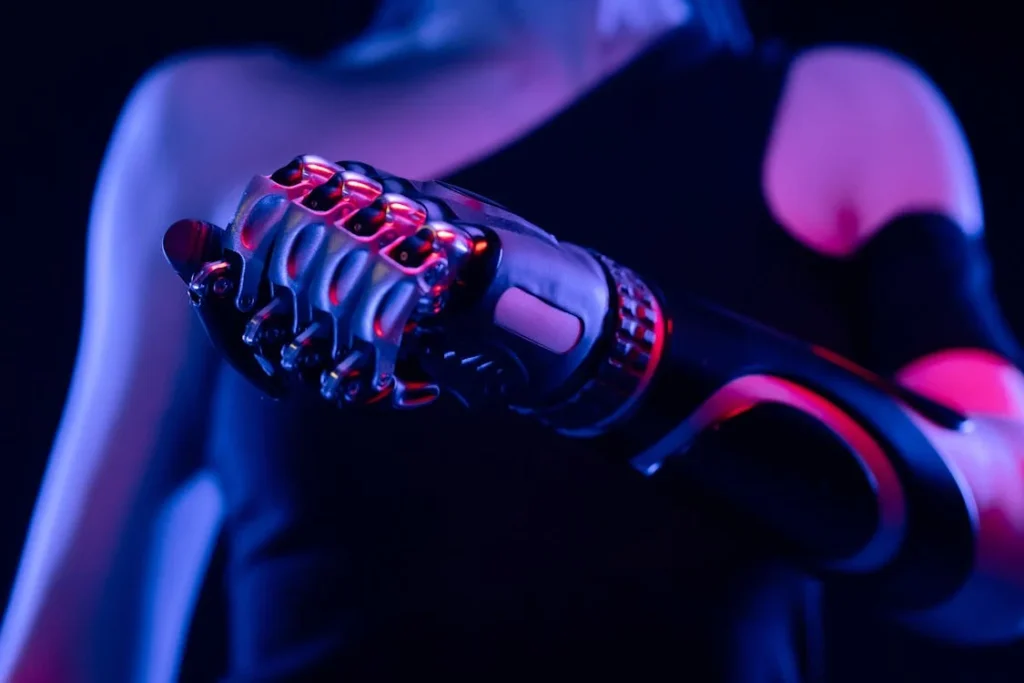
In the narrow lanes of Varanasi, life is vivid and full of movement. People carry goods, balance clay pots, ring temple bells, and ride scooters through busy streets.
It’s a city that demands active participation, and when someone is unable to use one hand, the smallest tasks become overwhelming. That’s exactly why our mission became personal when we started working with individuals in Varanasi.
One such individual was a young woman from the Assi Ghat area. She had lost her hand in an accident and had withdrawn from social activities. Even things like attending ceremonies or preparing food with her mother became too painful to face.
Her family contacted us, unsure of what to expect, but hoping for some way to help her regain confidence. After being fitted with a Robobionics bionic hand, her posture changed. She started speaking more during our sessions.
Soon, she was helping in the kitchen again, even serving guests at a family function. Her transformation was not just physical—it was emotional.
We also met a boatman in his fifties who feared he’d never return to work after a workplace injury. He didn’t need a fancy device. He needed something sturdy, something that would allow him to tie ropes, count change, and greet customers with a handshake.
After weeks of working with him, he was back on his boat, using his bionic hand like it had always been there. His smile said more than any testimonial ever could.
These are not rare cases. These are the kinds of outcomes we strive for every day. And we take these moments seriously because they remind us why we started this journey—to serve people where they are, and to give back something essential that was taken away.
Getting a prosthetic hand isn’t a one-time event—it’s a process. It doesn’t end when we hand over the device. In fact, that’s when the most important part begins. Our job is to ensure that every user feels supported, trained, and cared for, not just during the fitting, but long after.
In Varanasi, where many families are close-knit and routines are rooted in tradition, we understand that any change in the household affects more than one person.
That’s why we often involve family members during training sessions. We teach not just the user, but also the people around them—how to help, how to encourage, and how to make the transition smooth.
We provide one-on-one follow-up appointments, either in person or online, depending on what’s convenient. These sessions allow us to fine-tune the device, answer questions, and offer additional tips based on real-life feedback.
If there’s ever a problem—be it a technical glitch or discomfort with the fit—we respond quickly. We don’t make users chase us for help. We make sure help is already on the way.
We’ve also partnered with local health workers and therapy centers in and around Varanasi to expand this circle of care. So even if someone lives a few kilometers outside the city, they’re never far from our support.
When someone wears a bionic hand for the first time, the feeling is hard to describe. It’s part amazement, part confusion, and a whole lot of hope. But like anything new, it takes some getting used to. That’s why our training is designed to feel natural and simple, not like a medical exercise.
We start small. Just opening and closing the hand. Holding a spoon. Gripping a bottle. These are not just drills—they are steps toward independence.
As the user gains control and confidence, we introduce more activities tailored to their lifestyle. For someone in Varanasi, that might mean helping with household chores, carrying puja items, or managing a shop counter. The training always matches the reality of the user’s world.
Because our technology works based on muscle signals, it responds to intent. Once the user starts trusting the system, movements become fluid. They stop thinking about the hand as a tool and start using it as if it were their own. That’s our goal. Not just function, but familiarity.
We know that in a city like Varanasi, where mornings start early and days run long, reliability matters more than fancy features. That’s why we’ve engineered our bionic hands to be tough, just like the people who use them.
Whether you’re working on your feet all day or moving through crowded streets, the hand is built to stay with you, not slow you down.
It’s dust-resistant, weather-tolerant, and runs for hours on a single charge. The materials are selected to prevent skin irritation, especially important in warmer climates. And it’s lightweight—something that might not sound like a big deal, until you wear it all day and forget it’s even there.
We’ve seen users in Varanasi wear their Robobionics hand to weddings, to markets, to schools, and even on pilgrimage walks. That’s the level of comfort and trust we aim for. It’s not just about what the hand can do—it’s about how it fits into your life without making you feel different or limited.
The biggest concern we hear from families is about cost. It’s understandable. Medical devices can be expensive, and there’s a fear that something this advanced might be out of reach. At Robobionics, we’ve made it our mission to change that.
Because we design and manufacture our devices in India, we control the costs and pass those savings on to you. We don’t import overpriced parts.
We don’t rely on third-party companies. Everything is developed by our own team, which means the quality is high, but the price stays fair.
We also offer flexible payment options. If someone in Varanasi needs support with financing, we walk them through what’s possible.
We partner with charitable organizations, local healthcare programs, and even private sponsors to make sure no one is turned away for financial reasons.
We believe that access to life-changing technology shouldn’t be a luxury. It should be a right. And we do everything we can to make that right a reality for as many people as possible.
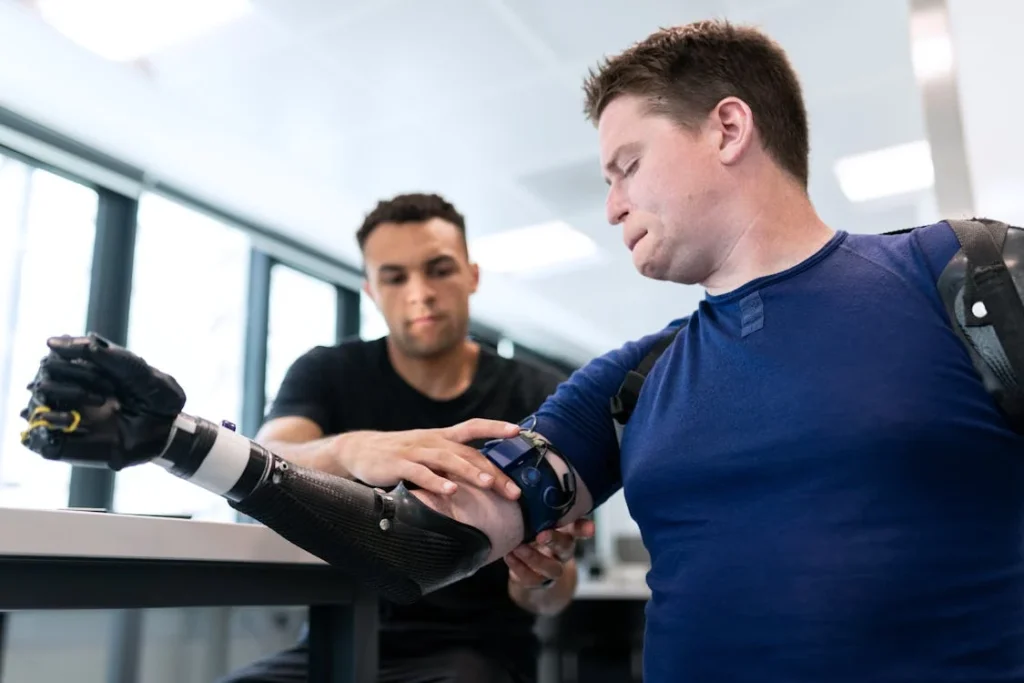
Robobionics didn’t build its reputation overnight. Our presence in Varanasi has grown steadily, not just because of the technology, but because of the trust we’ve earned from the medical community.
When doctors refer patients to us, it’s because they’ve seen the results. They’ve watched people regain strength, balance, and independence. They’ve seen their patients return for check-ups not with frustration, but with smiles.
Our team collaborates closely with orthopedic surgeons, physiotherapists, and rehabilitation specialists across Varanasi and nearby districts. We understand that recovery doesn’t stop with a device—it continues through therapy, support, and adjustments.
When a doctor refers a patient, we immediately loop in their healthcare provider to make sure everything is aligned. That kind of coordination isn’t just helpful—it’s essential for long-term success.
And the medical professionals we work with are not just allies—they’re learners, too. We regularly hold awareness programs and workshops for doctors and therapists, sharing updates on how our bionic technology works, how to spot the right candidates, and how to support them after the fitting.
That means whether you’re coming from a big hospital or a small clinic, you can expect informed care throughout your recovery.
Some of our strongest supporters in Varanasi aren’t doctors or technicians—they’re families.
When someone regains the ability to help in the kitchen, walk into a job interview, or play with their child again, the impact is felt by everyone around them. It lifts a weight. It restores normalcy. It gives back the flow of daily life.
We’ve seen parents get emotional watching their child feed themselves for the first time. We’ve seen spouses laugh as their partner lifts a cup after months of struggle.
We’ve even seen grandparents come in later, asking if we can help them too, after watching a younger family member succeed with a Robobionics hand.
When families speak about our work, they talk about being treated with respect. They talk about how we explained everything clearly, without jargon.
How we gave them time to make decisions. How we stood by them, long after the fitting. This trust doesn’t come from advertising. It comes from doing the right thing, every time.
In fact, a large number of our users in Varanasi find us through word of mouth. One neighbor sees another with a functional hand and asks where they got it.
A relative notices someone dressing independently again and wants the same for their loved one. This organic growth tells us one thing: we’re solving real problems in a way people can feel and see.
People sometimes assume that the best medical technology comes from outside India. But the truth is, foreign products often don’t match our local needs.
They’re too expensive, too complicated, or simply not built for the climate and culture we live in. That’s why Robobionics proudly designs and manufactures every component right here in India.
For someone in Varanasi, that means a lot. It means faster service. Lower costs. Better aftercare. And most of all, it means you’re using a product built by people who understand what your day looks like.
We’ve made sure our bionic hand can hold temple lamps during evening aarti. We’ve ensured it works smoothly even in Varanasi’s humid summers and doesn’t slip during long days out.
These are small details, but they matter deeply when you’re living with the device every single day.
We also use locally available components where possible. This means if a small part ever needs replacement, you won’t be waiting weeks for an international shipment.
We have service partners and spare part availability across northern India, including in and around Varanasi, so help is always nearby.
When you use a Robobionics bionic hand, you’re not fighting with technology—you’re flowing with it. That’s because we’ve designed everything with the user in mind.
The sensors that pick up your muscle signals don’t need deep pressure or repeated tapping. They respond to the slightest flex, which means using the hand feels effortless over time.
Most users master basic control within a few hours. Over the next few days, they begin doing things they hadn’t tried in months or even years. Eating on their own. Holding a water jug.
Carrying shopping bags. The real victory, however, comes when they stop thinking about the hand altogether. It becomes part of their routine, not a piece of equipment.
This simplicity is backed by complex technology. Inside the device is a motor system that adjusts grip force automatically depending on what you’re holding.
Lightweight objects like paper are held gently. Heavier items like bottles or tools get a firmer grip. All this happens behind the scenes, so users don’t have to manage any controls manually.
We also provide updates regularly. Our newer models can be synced for occasional software enhancements, which we help users install during follow-ups. It’s a level of tech evolution that ensures your device gets better over time, not outdated.
For us, accessibility means more than just making the hand available for purchase. It means removing every possible barrier between the person and their progress.
This starts with education. We’ve found that many people in Varanasi still don’t know that bionic hands exist—or that they can actually afford one. Some think it’s only for elite hospitals.
Others worry it’ll be too technical for them to use. So we meet people where they are. We explain things in simple terms. We show demonstrations. We let them try the device. That’s how myths are broken and hope begins.
It continues with location. Not everyone can travel far for assessments and fittings.
That’s why we’ve started building networks with clinics and rehab centers within Varanasi, so people can get started close to home. We’ve even conducted mobile fitting sessions for those who can’t travel at all.
We also work behind the scenes with donors, local trusts, and CSR programs to help cover costs for people who need it. When someone shows the will, we find a way.
We don’t see a prosthetic hand as the end of a journey. We see it as the start of something new. For the people of Varanasi, we believe the next chapter should be one of opportunity, growth, and renewed self-worth.
As our technology continues to improve and as more people learn about what’s possible, we see a future where no one has to give up on life because of a missing hand.
Whether you’re a young student, a skilled craftsman, a mother, a grandparent, or just someone ready to take life back into your own hands—we’re here for you.

In a place like Varanasi, where life happens out in the open—at ghats, in markets, during festivals, and across tightly connected neighborhoods—individual identity is constantly seen and felt in the public space.
People are recognized by how they walk, what they wear, how they greet others, and how they participate in rituals and traditions. Losing a hand, in such a setting, can deeply affect not just mobility, but visibility—how someone sees themselves and how others see them.
We’ve met individuals who told us they avoided public places after their amputation. Not because they couldn’t physically go, but because they didn’t want to answer questions.
They didn’t want to be stared at or pitied. The physical absence of a hand often became a constant emotional presence in their daily lives. And that feeling—of being seen as incomplete—took a bigger toll than the injury itself.
In Varanasi, social identity is deeply tied to contribution. Whether it’s offering flowers during puja, making sweets during Diwali, or handing a garland to a guest, the role of the hand is not only practical but symbolic.
Being unable to perform these gestures can feel like being cut off from society. That’s where the bionic hand changes everything—not just functionally, but socially.
We’ve seen many users in Varanasi go through a powerful change after getting their Robobionics hand. At first, they approach us quietly, cautiously hopeful.
Some even ask if the hand can be worn under sleeves to avoid attention. But weeks later, they return, showing off the hand with pride. It’s no longer something to hide. It’s a story to share.
This shift isn’t just about the technology—it’s about regaining identity. When you can perform aarti again, light incense, hand a flower to your guru, or simply offer a handshake with confidence, you stop feeling like an outsider. You return to your circle of belonging.
We’ve had users attend weddings they once avoided. Others started posting photos online—something they had stopped doing after their accident.
Some even gave public talks, showing how they use the hand to inspire others. These are the moments that remind us of the deeper role of bionics: not just restoring motion, but restoring meaning.
In Varanasi, religious rituals are an everyday part of life. Many of these rituals involve using both hands—offering water, lighting diyas, distributing prasad, or participating in traditional gestures. Being unable to perform these acts, especially in a city where devotion is so visible, can feel isolating.
That’s why our bionic hand isn’t just engineered for function—it’s tuned to respect rituals. We’ve had conversations with spiritual leaders to understand how people with limb loss can remain fully involved in sacred acts.
From helping the hand hold a puja thali with stability, to adjusting grip sensitivity for lighting incense sticks, these aren’t just features—they’re bridges back into spiritual life.
Some users even told us that they feared they were no longer “complete” in the eyes of tradition. But after using the bionic hand to rejoin prayer ceremonies, that fear began to dissolve. Being part of faith again, on their own terms, brought emotional peace. And that’s something no manual can teach, and no software can calculate.
In a city where social roles and community identity hold strong importance, a bionic hand can become more than a medical device—it becomes a symbol of strength. People start to associate the user not with what they’ve lost, but with what they’ve overcome. It flips the story.
Children in school are no longer the ones being stared at—they become the ones everyone gathers around to watch how cool their robotic hand is.
A vendor at the market isn’t just someone who faced an accident—he’s now seen as the one who embraced technology and came back stronger.
In our field work, we’ve heard phrases like, “She’s stronger now,” or “He looks more confident than ever,” from neighbors and friends.
That shift, from sympathy to admiration, is the true measure of success in many of our cases in Varanasi. It’s the community giving its approval, not out of pity, but out of genuine respect.
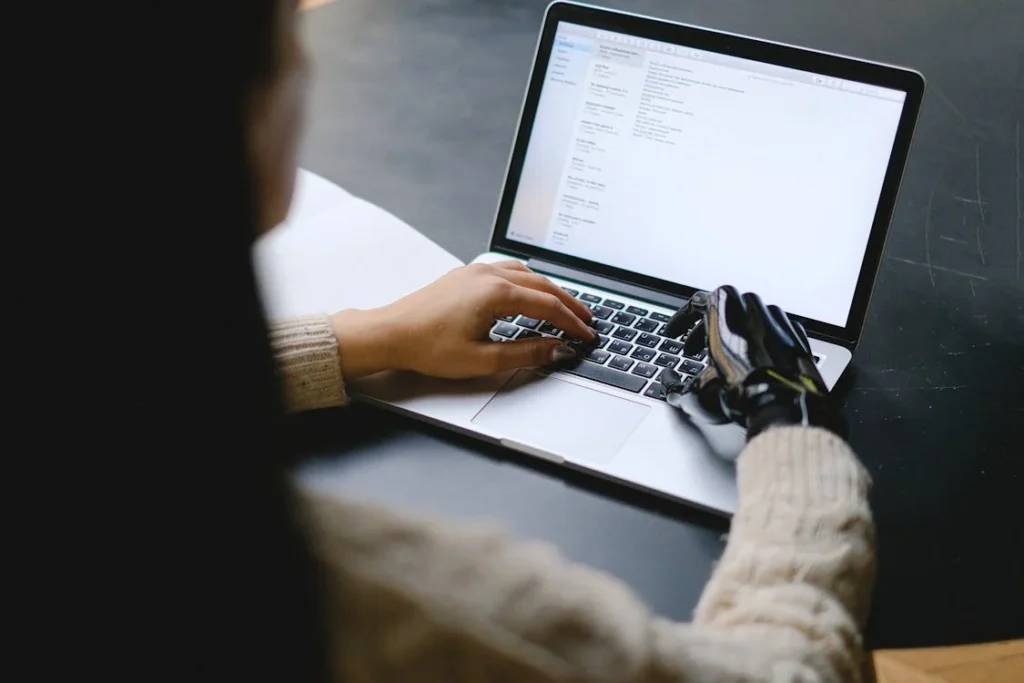
In a city like Varanasi, where most people are self-employed, involved in small-scale trade, or connected to traditional crafts, work isn’t just a source of income—it’s a source of pride.
Whether it’s a weaver perfecting intricate silk patterns, a tea vendor serving customers with flair, or a mechanic who knows every sound a scooter makes, hands are the tools of the trade.
When one of those hands is lost, the impact is immediate and often devastating—not just economically, but psychologically.
We’ve met men who had to shut down their shops because they couldn’t lift a pan or count change. We’ve spoken to women who stopped contributing to the family business because they felt too slow or dependent.
Many of them didn’t know that returning to work was even possible. They assumed their professional life had ended the day they lost their hand.
At Robobionics, we believe strongly in restoring not just movement, but economic independence. That means helping people in Varanasi get back to work—not someday, but as soon as they’re ready.
It means giving them the confidence to open their stalls again, take on clients, or even try something new.
One of our earliest Varanasi users was a tailor. After losing his right hand in an accident, he thought he’d never stitch again. But with a Robobionics hand, and a little retraining, he returned to work within three months.
He learned how to hold fabric, operate tools, and guide his clients just as before. Today, he tells his customers that he didn’t “lose a hand”—he gained a new one.
Another user, a female papad-maker, came to us quietly. Her livelihood depended on repetitive hand movements—rolling, flattening, packing.
After getting fitted with a bionic hand, she returned not only to production but increased it, since the device reduced the strain on her remaining hand. Her business grew, and now she even employs a few others.
These stories are not exceptions—they’re possibilities that exist for many more people across Varanasi. With the right support and the right tools, a bionic hand can literally change the economic path of a family.
Many people don’t work in what’s traditionally considered “skilled labor.” They run errands, do cleaning, prepare food, or offer services like flower selling, clay pot making, and repairing electronics.
But these are the very jobs where hand function is essential. And often, these are the people who can’t afford to be out of work for long.
A bionic hand makes returning to these jobs not only possible, but smoother than most expect. Since our devices respond to muscle signals and require minimal setup, users can return to their routine in days, not months.
They can lift, press, hold, and turn. They can work long hours without fatigue. More importantly, they don’t need a constant helper—meaning they can earn, contribute, and operate independently.
This return to daily work restores more than income—it restores dignity. We’ve seen users walk into temples and markets again, not to ask for help, but to sell, serve, and smile. For many, the Robobionics hand is their passport back into a life they feared they had lost.
For younger users in Varanasi, especially students or job seekers, the loss of a limb can feel like the end of opportunity. They start to believe that certain careers are no longer open to them. They cancel interviews. They avoid exams. Their dreams shrink.
We’re actively working to change that. Several of our younger users have returned to colleges, re-enrolled in training programs, and even landed desk jobs after learning how to use a mouse, keyboard, and phone with their bionic hand.
The ease of control means they can type, write, and even draw again.
One young man, originally studying to be a computer technician, returned to his course after training with us. He now works at a mobile repair shop in Varanasi, handling tiny components with care—something even he thought would be impossible.
His employer didn’t hire him out of sympathy. He hired him because he was the best candidate for the job.
The technology opens the door. But it’s the confidence it builds that helps someone walk through it.
Robobionics also works on helping users understand the financial systems around them. Many of our clients have never taken loans or used EMI options before.
We guide them through payment plans, subsidy schemes, and in some cases, help them apply for financial support through NGOs or local trusts.
We also encourage small entrepreneurs to explore micro-financing or digital marketplaces to expand their businesses once they return to work. We’ve helped a few start digital payment systems so they can manage transactions more easily with one hand.
Our goal isn’t just to fit a hand. It’s to equip people for financial resilience, so they’re not dependent on others. We believe economic empowerment is the most powerful kind of rehabilitation. And we’re proud to be part of that journey.
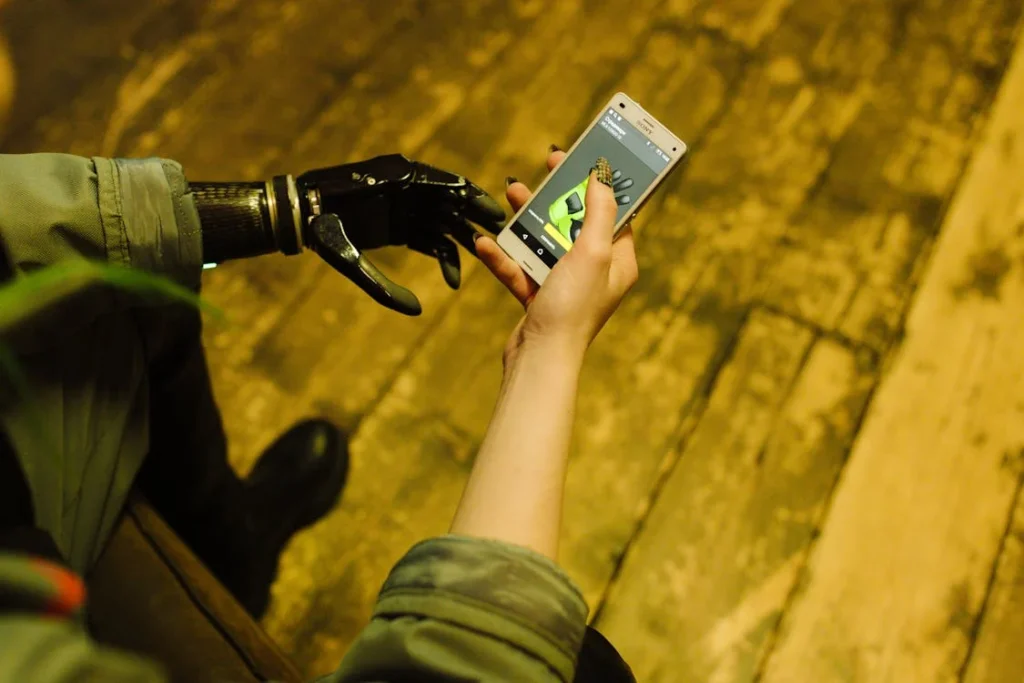
In Indian society, especially in cities like Varanasi where tradition often shapes gender roles, women are expected to manage multiple responsibilities—cooking, caregiving, cleaning, managing religious duties, and sometimes even contributing to the family income.
These tasks may seem ordinary, but they all rely heavily on hand function.
When a woman loses her hand, she doesn’t just lose the ability to do these tasks—she risks losing her place in the household rhythm. Many of the women we’ve met in Varanasi told us they felt ashamed when they couldn’t serve meals or dress their children.
Some stopped participating in festivals and community events. A few even reported feeling like they were “less” of a wife or mother because they could no longer “do everything.”
This kind of emotional toll is rarely discussed in public, but it is deeply felt in private. It’s not just about the limb—it’s about identity, acceptance, and the quiet but powerful expectation that women “manage everything” gracefully.
At Robobionics, we’ve made it a mission to restore not just movement, but that quiet confidence that women carry every day.
For most women in Varanasi, the day begins before the sun rises. Lighting the stove, kneading dough, filling water, bathing children—these are not symbolic actions; they’re acts of service and care. And every single one of them depends on two working hands.
With the Robobionics bionic hand, we’ve seen women resume these tasks with surprising ease. Because our device is built for real-world functionality, it doesn’t just grip—it adapts.
It can hold steel utensils, turn taps, twist jars, and roll chapatis. One woman from the Godowlia area told us she made her entire lunch for the first time in a year after receiving the hand. She didn’t cry out of frustration that day—she cried out of joy.
Another woman, a home-based tailor, was able to return to sewing with some retraining. She began taking small orders from neighbors again. She said, “People used to come to see me out of pity. Now they come to give me work.”
These small victories may not make headlines—but they change lives in the most personal, powerful ways.
For women in Varanasi, festivals and religious observances are central to life. But many rituals—offering aarti, applying sindoor, tying rakhis, handling idols—require delicate hand movement and two-handed coordination.
After an amputation, many women avoid these events, not because they don’t believe, but because they feel incomplete or embarrassed.
We’ve carefully developed our bionic hand to support cultural participation. The hand can be used to gently hold flower offerings, pinch incense sticks, and clasp hands in prayer.
Its lightweight design means women can wear it all day during long functions or ceremonies. And because it looks natural and blends well with traditional clothing, it doesn’t attract unwanted attention.
We had a user who rejoined her bhajan group six months after being fitted. She told us, “For the first time in years, I clapped without feeling self-conscious.” That one sentence held years of silent struggle—and quiet triumph.
While women are traditionally seen as homemakers in many parts of Varanasi, more and more are becoming earners too—making food items, tailoring clothes, giving tuitions, or selling handmade goods.
For women who lose a hand, these economic opportunities often vanish overnight.
A bionic hand changes that equation. Once trained, many women go back to earning—and in some cases, earning more than before. They take pride not just in being useful again, but in contributing financially.
One of our users started selling herbal products from home after her confidence returned. Her story inspired other women in her area to inquire about the hand, not just for themselves but for their daughters and relatives.
When women earn, the entire family benefits. Children go back to school. Homes run with less pressure. And most importantly, the woman herself begins to see her worth in a new light—not because someone gave her help, but because she took back her power.
There’s a special kind of strength in the women of Varanasi. It’s quiet, steady, and endlessly resilient. These are women who wake up early, serve others before themselves, and carry the emotional weight of their households.
But when injury or disability strikes, that strength is tested—and often hidden.
What we’ve seen with the Robobionics hand is not just the return of physical function, but the return of inner strength. Women start walking straighter, speaking louder, and smiling more.
They stop apologizing for what they can’t do and start showing the world what they can do. And when their families see this change, the entire household’s attitude shifts from pity to pride.
We believe every woman has the right to feel strong, capable, and self-sufficient. Whether she’s a grandmother, a new mother, a student, or a working professional—she deserves tools that match her spirit.
The bionic hand is one such tool, and in the hands of a woman determined to rise again, it becomes something far more powerful: a symbol of unbreakable will.
In a city as soulful and strong as Varanasi, every life carries deep purpose. At Robobionics, we’re honored to be part of that purpose—by helping individuals reclaim their independence, confidence, and dignity through advanced, yet simple-to-use bionic hands. Whether you’re a mother managing your home, a student chasing dreams, a craftsman rebuilding a career, or someone rediscovering your place in society after limb loss—we’re here for you. Our bionic hands aren’t just devices; they’re pathways to a fuller life.
We understand Varanasi. We respect its rhythm, its rituals, and its resilience. That’s why we’ve built solutions that work not just in labs, but in the lanes, temples, shops, and homes of this city. The best time to begin again is now. And when you’re ready, Robobionics will be right here—helping you take life back into your hands.
Let’s make today the start of something new. Reach out. Talk to us. Try it. Because the journey forward doesn’t have to wait any longer.

For many clinicians, the surgery is only the first step. What happens after the operation

For trauma amputees, the journey does not begin at the prosthetic clinic. It begins much

Amputation after cancer is not just a surgical event. It is the end of one

When a child loses a limb, the challenge is never only physical. A child’s body
Last updated: November 10, 2022
Thank you for shopping at Robo Bionics.
If, for any reason, You are not completely satisfied with a purchase We invite You to review our policy on refunds and returns.
The following terms are applicable for any products that You purchased with Us.
The words of which the initial letter is capitalized have meanings defined under the following conditions. The following definitions shall have the same meaning regardless of whether they appear in singular or in plural.
For the purposes of this Return and Refund Policy:
Company (referred to as either “the Company”, “Robo Bionics”, “We”, “Us” or “Our” in this Agreement) refers to Bionic Hope Private Limited, Pearl Haven, 1st Floor Kumbharwada, Manickpur Near St. Michael’s Church Vasai Road West, Palghar Maharashtra 401202.
Goods refer to the items offered for sale on the Website.
Orders mean a request by You to purchase Goods from Us.
Service refers to the Services Provided like Online Demo and Live Demo.
Website refers to Robo Bionics, accessible from https://robobionics.in
You means the individual accessing or using the Service, or the company, or other legal entity on behalf of which such individual is accessing or using the Service, as applicable.
You are entitled to cancel Your Service Bookings within 7 days without giving any reason for doing so, before completion of Delivery.
The deadline for cancelling a Service Booking is 7 days from the date on which You received the Confirmation of Service.
In order to exercise Your right of cancellation, You must inform Us of your decision by means of a clear statement. You can inform us of your decision by:
We will reimburse You no later than 7 days from the day on which We receive your request for cancellation, if above criteria is met. We will use the same means of payment as You used for the Service Booking, and You will not incur any fees for such reimbursement.
Please note in case you miss a Service Booking or Re-schedule the same we shall only entertain the request once.
In order for the Goods to be eligible for a return, please make sure that:
The following Goods cannot be returned:
We reserve the right to refuse returns of any merchandise that does not meet the above return conditions in our sole discretion.
Only regular priced Goods may be refunded by 50%. Unfortunately, Goods on sale cannot be refunded. This exclusion may not apply to You if it is not permitted by applicable law.
You are responsible for the cost and risk of returning the Goods to Us. You should send the Goods at the following:
We cannot be held responsible for Goods damaged or lost in return shipment. Therefore, We recommend an insured and trackable courier service. We are unable to issue a refund without actual receipt of the Goods or proof of received return delivery.
If you have any questions about our Returns and Refunds Policy, please contact us:
Last Updated on: 1st Jan 2021
These Terms and Conditions (“Terms”) govern Your access to and use of the website, platforms, applications, products and services (ively, the “Services”) offered by Robo Bionics® (a registered trademark of Bionic Hope Private Limited, also used as a trade name), a company incorporated under the Companies Act, 2013, having its Corporate office at Pearl Heaven Bungalow, 1st Floor, Manickpur, Kumbharwada, Vasai Road (West), Palghar – 401202, Maharashtra, India (“Company”, “We”, “Us” or “Our”). By accessing or using the Services, You (each a “User”) agree to be bound by these Terms and all applicable laws and regulations. If You do not agree with any part of these Terms, You must immediately discontinue use of the Services.
1.1 “Individual Consumer” means a natural person aged eighteen (18) years or above who registers to use Our products or Services following evaluation and prescription by a Rehabilitation Council of India (“RCI”)–registered Prosthetist.
1.2 “Entity Consumer” means a corporate organisation, nonprofit entity, CSR sponsor or other registered organisation that sponsors one or more Individual Consumers to use Our products or Services.
1.3 “Clinic” means an RCI-registered Prosthetics and Orthotics centre or Prosthetist that purchases products and Services from Us for fitment to Individual Consumers.
1.4 “Platform” means RehabConnect™, Our online marketplace by which Individual or Entity Consumers connect with Clinics in their chosen locations.
1.5 “Products” means Grippy® Bionic Hand, Grippy® Mech, BrawnBand™, WeightBand™, consumables, accessories and related hardware.
1.6 “Apps” means Our clinician-facing and end-user software applications supporting Product use and data collection.
1.7 “Impact Dashboard™” means the analytics interface provided to CSR, NGO, corporate and hospital sponsors.
1.8 “Services” includes all Products, Apps, the Platform and the Impact Dashboard.
2.1 Individual Consumers must be at least eighteen (18) years old and undergo evaluation and prescription by an RCI-registered Prosthetist prior to purchase or use of any Products or Services.
2.2 Entity Consumers must be duly registered under the laws of India and may sponsor one or more Individual Consumers.
2.3 Clinics must maintain valid RCI registration and comply with all applicable clinical and professional standards.
3.1 Robo Bionics acts solely as an intermediary connecting Users with Clinics via the Platform. We do not endorse or guarantee the quality, legality or outcomes of services rendered by any Clinic. Each Clinic is solely responsible for its professional services and compliance with applicable laws and regulations.
4.1 All content, trademarks, logos, designs and software on Our website, Apps and Platform are the exclusive property of Bionic Hope Private Limited or its licensors.
4.2 Subject to these Terms, We grant You a limited, non-exclusive, non-transferable, revocable license to use the Services for personal, non-commercial purposes.
4.3 You may not reproduce, modify, distribute, decompile, reverse engineer or create derivative works of any portion of the Services without Our prior written consent.
5.1 Limited Warranty. We warrant that Products will be free from workmanship defects under normal use as follows:
(a) Grippy™ Bionic Hand, BrawnBand® and WeightBand®: one (1) year from date of purchase, covering manufacturing defects only.
(b) Chargers and batteries: six (6) months from date of purchase.
(c) Grippy Mech™: three (3) months from date of purchase.
(d) Consumables (e.g., gloves, carry bags): no warranty.
5.2 Custom Sockets. Sockets fabricated by Clinics are covered only by the Clinic’s optional warranty and subject to physiological changes (e.g., stump volume, muscle sensitivity).
5.3 Exclusions. Warranty does not apply to damage caused by misuse, user negligence, unauthorised repairs, Acts of God, or failure to follow the Instruction Manual.
5.4 Claims. To claim warranty, You must register the Product online, provide proof of purchase, and follow the procedures set out in the Warranty Card.
5.5 Disclaimer. To the maximum extent permitted by law, all other warranties, express or implied, including merchantability and fitness for a particular purpose, are disclaimed.
6.1 We collect personal contact details, physiological evaluation data, body measurements, sensor calibration values, device usage statistics and warranty information (“User Data”).
6.2 User Data is stored on secure servers of our third-party service providers and transmitted via encrypted APIs.
6.3 By using the Services, You consent to collection, storage, processing and transfer of User Data within Our internal ecosystem and to third-party service providers for analytics, R&D and support.
6.4 We implement reasonable security measures and comply with the Information Technology Act, 2000, and Information Technology (Reasonable Security Practices and Procedures and Sensitive Personal Data or Information) Rules, 2011.
6.5 A separate Privacy Policy sets out detailed information on data processing, user rights, grievance redressal and cross-border transfers, which forms part of these Terms.
7.1 Pursuant to the Information Technology Rules, 2021, We have given the Charge of Grievance Officer to our QC Head:
- Address: Grievance Officer
- Email: support@robobionics.in
- Phone: +91-8668372127
7.2 All support tickets and grievances must be submitted exclusively via the Robo Bionics Customer Support portal at https://robobionics.freshdesk.com/.
7.3 We will acknowledge receipt of your ticket within twenty-four (24) working hours and endeavour to resolve or provide a substantive response within seventy-two (72) working hours, excluding weekends and public holidays.
8.1 Pricing. Product and Service pricing is as per quotations or purchase orders agreed in writing.
8.2 Payment. We offer (a) 100% advance payment with possible incentives or (b) stage-wise payment plans without incentives.
8.3 Refunds. No refunds, except pro-rata adjustment where an Individual Consumer is medically unfit to proceed or elects to withdraw mid-stage, in which case unused stage fees apply.
9.1 Users must follow instructions provided by RCI-registered professionals and the User Manual.
9.2 Users and Entity Consumers shall indemnify and hold Us harmless from all liabilities, claims, damages and expenses arising from misuse of the Products, failure to follow professional guidance, or violation of these Terms.
10.1 To the extent permitted by law, Our total liability for any claim arising out of or in connection with these Terms or the Services shall not exceed the aggregate amount paid by You to Us in the twelve (12) months preceding the claim.
10.2 We shall not be liable for any indirect, incidental, consequential or punitive damages, including loss of profit, data or goodwill.
11.1 Our Products are classified as “Rehabilitation Aids,” not medical devices for diagnostic purposes.
11.2 Manufactured under ISO 13485:2016 quality management and tested for electrical safety under IEC 60601-1 and IEC 60601-1-2.
11.3 Products shall only be used under prescription and supervision of RCI-registered Prosthetists, Physiotherapists or Occupational Therapists.
We do not host third-party content or hardware. Any third-party services integrated with Our Apps are subject to their own terms and privacy policies.
13.1 All intellectual property rights in the Services and User Data remain with Us or our licensors.
13.2 Users grant Us a perpetual, irrevocable, royalty-free licence to use anonymised usage data for analytics, product improvement and marketing.
14.1 We may amend these Terms at any time. Material changes shall be notified to registered Users at least thirty (30) days prior to the effective date, via email and website notice.
14.2 Continued use of the Services after the effective date constitutes acceptance of the revised Terms.
Neither party shall be liable for delay or failure to perform any obligation under these Terms due to causes beyond its reasonable control, including Acts of God, pandemics, strikes, war, terrorism or government regulations.
16.1 All disputes shall be referred to and finally resolved by arbitration under the Arbitration and Conciliation Act, 1996.
16.2 A sole arbitrator shall be appointed by Bionic Hope Private Limited or, failing agreement within thirty (30) days, by the Mumbai Centre for International Arbitration.
16.3 Seat of arbitration: Mumbai, India.
16.4 Governing law: Laws of India.
16.5 Courts at Mumbai have exclusive jurisdiction over any proceedings to enforce an arbitral award.
17.1 Severability. If any provision is held invalid or unenforceable, the remainder shall remain in full force.
17.2 Waiver. No waiver of any breach shall constitute a waiver of any subsequent breach of the same or any other provision.
17.3 Assignment. You may not assign your rights or obligations without Our prior written consent.
By accessing or using the Products and/or Services of Bionic Hope Private Limited, You acknowledge that You have read, understood and agree to be bound by these Terms and Conditions.